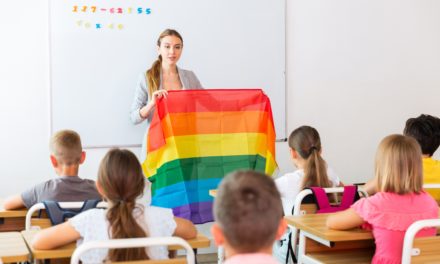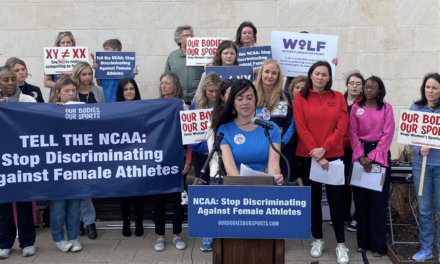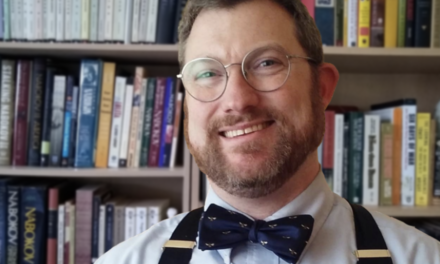Tuesday, March 5 is the ninth annual National Day of Reading: A Celebration of Stories Supporting Transgender and Non-Binary Youth.
The Day of Reading targets elementary school children – ages five through 12 – with stories about sexual identity confusion.
The event is sponsored by the Human Rights Campaign Foundation’s program Welcoming Schools, the National Education Association and the American Association of School Librarians.
The “Transgender and Non-Binary Youth” reading day takes place smack in the middle of Read Across America Week, March 2-6, an annual event which begins on Dr. Seuss’ birthday.
Here are the three books recommended to indoctrinate elementary school children in schools and libraries across the country.
Introducing Teddy: A gentle story about gender and friendship is a picture book, recommended for preschool and up, that tells the story of a little boy, Errol, and his teddy bear named Thomas. One fine day, Thomas is really sad and eventually tells Errol what’s going on inside his stuffed head:
I need to be myself, Errol. In my heart, I’ve always known that I’m a girl teddy, not a boy teddy. I wish my name was Tilly, not Thomas.
Being a sensible lad, Errol explains that boys can’t turn into girls – but wait, that would mean the book’s author understood the nature of reality.
Instead, Thomas flips his bowtie into a bow on his head, magically transforming himself into a girl teddy bear.
The book inculcates young children into a deceptive gender ideology that teaches children they can turn into the opposite sex. HRC’s indoctrinating “Organizational Toolkit” explains the lesbian-identified author’s inspiration for writing the book:
Jessica Walton lives with her wife, son, and cats in Melbourne, Australia. She was inspired to write Introducing Teddy after her father transitioned into the woman she had always been on the inside, and Jess wanted to find a way to tell that story to her young son.
Discussion prompts for the book encourage children to use an individual’s new name and pronouns and to become an “ally” to those with sexual identity confusion.
47,000 Beads is the next book on the list, aimed at first through third graders. The story revolves around a young Lakota girl, Peyton, who decides she doesn’t want to continue dancing as a girl at the tribe’s powwow. Her two aunties and a non-binary friend, L, help Peyton understand that she is “two spirit” and doesn’t have to keep being a girl. And “grandparent L” will guide her into what that means.
The term “two-spirit” was coined in the nineties at a conference for gay-and lesbian-identified Native Americans. Malcolm Clark explains in an article in Spiked that the “mumbo-jumbo” term connotes approval from all tribal groups.
But this is not the case:
In truth, there was a startling range of attitudes to the “two-spirited” among the more than 500 separate indigenous Native American tribes. Certain tribes may have been relaxed about, say, effeminate men. Others were not.
In his history of homosexuality, The Construction of Homosexuality (1998), David Greenberg points out that those who are now being called “two spirit” were ridiculed by the Papago, held in contempt by the Choctaws, disliked by the Cocopa, treated by the Seven Nations with “the most sovereign contempt” and “derided” by the Sioux.
Yet schoolchildren are expected to imbibe this nonsense as if it were true.
47,000 Beads was authored by Koja Adeyoha, a “two-spirit, activist, organizer, socialist, feminist, and native Californian” and Angel Adeyoha, “a two-spirit, queer, Indigenous activist.” The illustrater identifies as “non-binary.”
The final reading, recommended for 9-12-year-olds, “The Gender Reveal,” is a short story by Kwame Mbalia, from the book Black Boy Joy: 17 Stories Celebrating Black Boyhood.
The story deals with “13-year-old Malcolm, who struggles with telling the world who they [sic] really are” – non-binary.
Mbalia authored the infamous All Boys Aren’t Blue, one of the most challenged books of 2023 because of content that includes, according to BookLooks.org, “sexual nudity; sexual activities including sexual assault; alternate gender ideologies; profanity and derogatory terms; alcohol and drug use; and controversial racial commentary.”
Human Rights Campaign Foundation (HCRF) is the largest LGBT activist organization in the U.S, and the National Education Association and American Association of School Librarians are two of its most rabid supporters.
HRCF’s Welcoming Schools has been pushing LGBT ideology in schools for the past 20 years. The program describes its accomplishments:
Over 133,000 educators in all 50 U.S. States and 12 countries have participated in Welcoming Schools Professional Development to gain critical skills for creating LGBTQ+ and gender inclusive schools. Over the past 4 years, these educators have impacted over 10.5 million students.
Parents should definitely take action by contacting their child’s school and teacher to find out if they are participating in this day where schools celebrate “Stories Supporting Transgender and Non-Binary Youth.”
If so, it would be a good day to keep your child at home – and to consider alternate education possibilities.
Related articles and resources:
How to Talk to Your Children About Homosexuality
LGBT Activists, NEA and Librarians Promote Annual ‘Transgender’ Reading Day in Schools
Parent Resource Guide: Responding to the Transgender Issue
Resources When Your Child Encounters LGBT Ideology at School
What Gender-Confusing Books Did You Read in School Today, Johnny?
Image Credit: Welcoming Schools.






